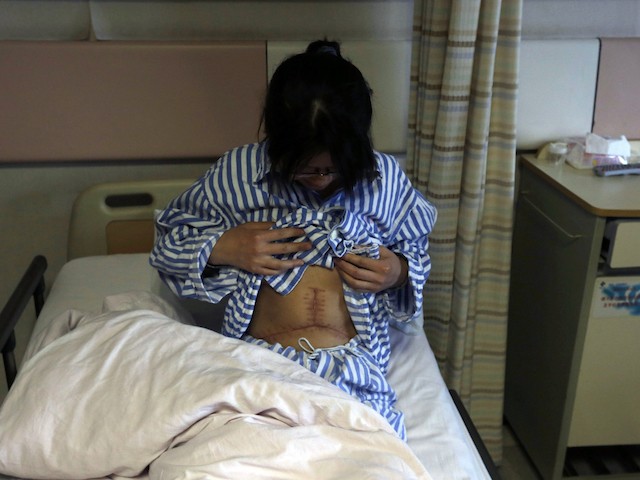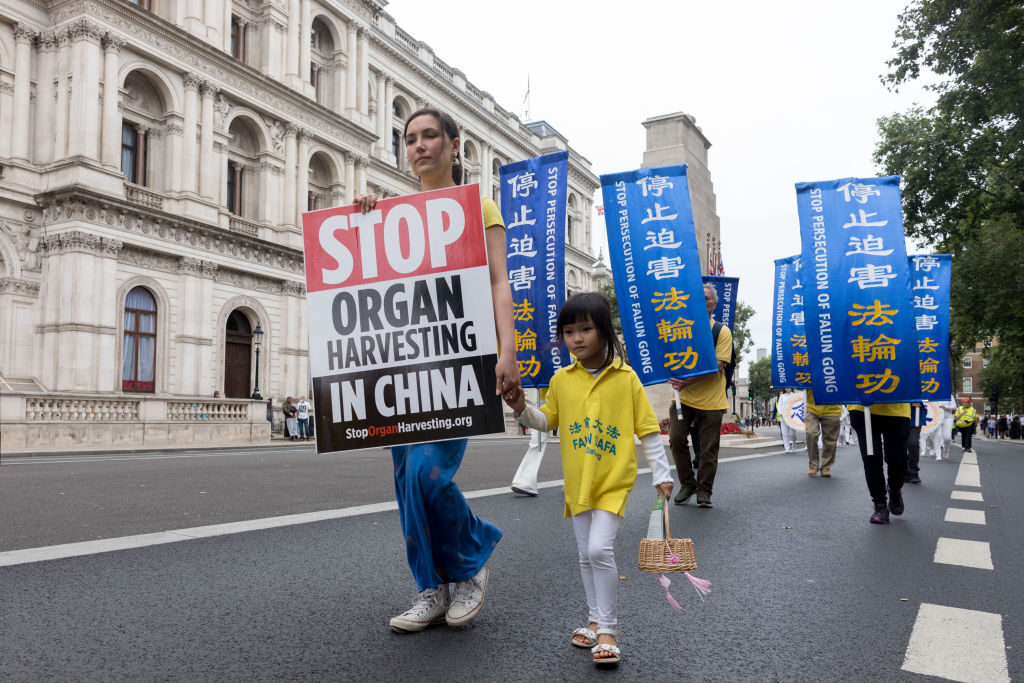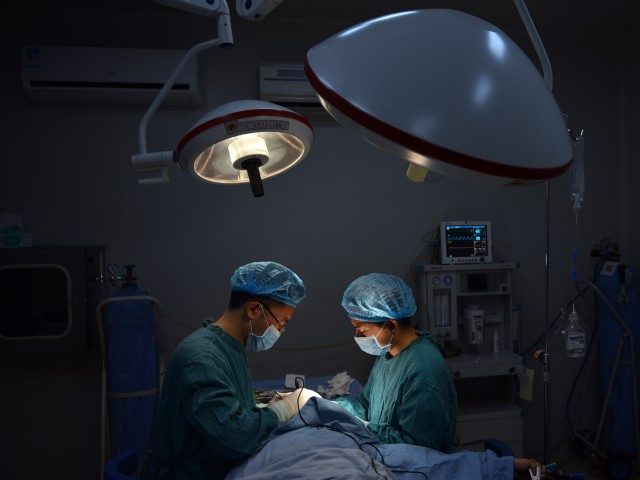The Chinese government held two events on organ “donation,” tied to its predatory Belt and Road Initiative (BRI), this weekend to boast of its alleged advancements in organ transplant access and cut deals with Central Asian nations on medical training.
The “7th China-International Organ Donation Conference” and the “Belt & Road Symposium on Organ Donation and Transplantation International Cooperation Development” both occurred in Nanning, southern Guangxi province, this weekend.
The Chinese state-run Global Times boasted on Sunday that the Communist Party had tallied “more than 40,200 deceased organ donations from 2015 to the end of 2022, with 120,100 major organs donated,” and had convinced over 6.5 million Chinese people to register for organ donations. China uses a draconian “social credit system” to control the actions of its population, granting higher “scores” to people who are more fervent communists or engage in activity the regime chooses to prize while restricting the civil rights of those who practice a religion, publicly disagree with the government, or otherwise run afoul of the “Party.”
The Global Times also announced agreements with the neighboring country of Kazakhstan in which Beijing offered to train Kazakh doctors at Xinjiang Medical University hospital, a facility in occupied East Turkistan, and share expertise on organ donation.
The Chinese Communist Party is currently engaging in a genocide of Kazakh people in East Turkistan, in addition to the killing, torturing, forced sterilizing, and enslavement of the majority Uyghur population of the region, Kyrgyz inhabitants, and other non-Han groups. The Party, under directives from dictator Xi Jinping, built an elaborate network of over 1,000 concentration camps throughout East Turkistan to imprison Uyghurs, Kazakhs, Kyrgyz, and other Turkic people. Survivors of the camp have testified to being tortured, sterilized, enslaved, subject to gang rape, and — most relevant to the conference this weekend — medical testing consistent with live organ harvesting.
Live organ harvesting is the practice of extracting a person’s organs while alive to be used in a transplant. The practice kills the person and is considered a human rights atrocity. Human rights researchers and witnesses from within China have compiled decades of evidence that the Communist Party has killed political prisoners — particularly Uyghurs and Falun Gong practitioners — by carving them open to steal their organs. It is believed to be a highly lucrative practice given the inconsistencies in the number of organ transplants that China documents compared to how many organs are legally donated per year.

In this May 15, 2013 file photo, 28-year-old Fang Hui shows off the scar from a living donor organ transplant operation. China claims it ended the harvesting of executed inmates’ organs for transplants in January 2015. (AP Photo/Ng Han Guan, File)
“Currently, China ranks second in the world and first in Asia in terms of the number of organ donations,” the Global Times proclaimed on Sunday, citing statistics from the China Organ Transplant Development Foundation (COTDF). “However, organ donors per million people (PMP) is less than 4 percent, which is far from satisfactory compared to the 47 percent in developed countries.”
The Global Times, citing Huang Jiefu, chairman of China Human Organ Donation and Transplantation Committee and chair of the COTDF Advisory Board, that China had made dramatic and commendable strides in organ transplants as a result of the resilient effort of the Party and reforms that allowed people to register as organ donors more easily.
“The revision of the regulation demonstrates the Party and the country’s emphasis on organ donation, providing strong legal protection for the high-quality development of the organ donation cause,” Huang reportedly said, adding that he hoped the presence of the Chinese organ transplant system would become more prominent throughout the impoverished countries ensnared by the BRI.
The conferences this weekend resulted in a major victory for China’s health expansionism through the agreement with Kazakhstan. According to the Global Times, “Kazakhstan will send medical personnel to study at the Xinjiang Medical University hospital and Key State Laboratory specifically for research and treatment against high incidence diseases in Central Asia,” and China would also offer access to organ harvesting technology.
Experts on organ harvesting in China have compiled evidence that the Uyghur genocide has become a major source of organs, stolen from their owners likely while alive.
Ethan Gutmann — a senior researcher and co-author of the landmark works on Chinese regime organ harvesting, “Bloody Harvest” and “The Slaughter” — told Congress in May 2022 that he estimated China had harvested as many as 150,000 organs from concentration camp victims between 2017 and 2022.

Several Falun Gong members gathered in London to march across Westminster, bringing across messages including stop organ harvesting and political persecution in China. (Belinda Jlao/SOPA Images/LightRocket via Getty Images)
“If we assume that at any given time since 2017, there are approximately a million Uyghurs, Kazakhs, Kyrgyz and Hui in the camps, my estimate is that 25,000 to 50,000 camp detainees are being harvested every year,” Gutmann said. “Twenty-eight-year-olds from the Xinjiang [East Turkistan] camps can be theoretically harvested for two or three organs, translating into a minimum of 50,000 organs or a maximum of 150,000 organs.”
A study published by the Australian National University (ANU) in April of that year compiled evidence suggesting that China was executing political prisoners by carving out their organs.
“Might the transplant surgeon become the de facto executioner? Evidence suggestive of such behavior has emerged over many years from the People’s Republic of China (PRC),” the report stated.
“The data we rely on in this paper involves transplant surgeries from 1980 to 2015. During this period, there was no voluntary donation system and very few voluntary donors,” the report detailed. “According to three official sources … the number of voluntary (i.e., non-prisoner) organ donors in China cumulatively as of 2009 was either 120 or 130, representing only about 0.3% of the 120,000 organs officially reported to be transplanted during the same period (on the assumption that each voluntary donor gave three organs).”
The report noted Chinese officials — and Huang Jiefu, the doctor quoted in this weekend’s Global Times story personally — had openly admitted that the state was offering up prisoners for organ transplants.
“We are deeply grateful to the many cadres in the judicial system, because without their cooperation, without organs donated from death row prisoners, China’s transplantation system would not be as technologically advanced and mature as it is today,” Huang was quoted in the report as having said.
Huang addressed the condemnation of live organ harvesting from the international community in his remarks to the Global Times, stating, “You can never wake up someone who is pretending to be asleep … we are not afraid of those slanders, as long as what we are doing is justified and is on the right course.”

COMMENTS
Please let us know if you're having issues with commenting.